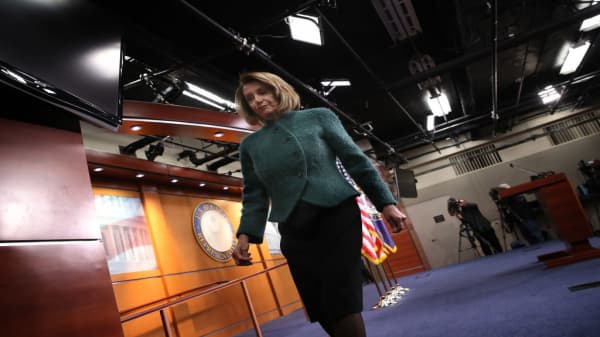House Speaker Nancy Pelosi, citing the government shutdown, urged President Donald Trump in a letter Wednesday to either reschedule his upcoming State of the Union address or to deliver it in writing to Congress.
“He can make it from the Oval Office if he wants,” Pelosi, D-California, later told reporters.
In her letter to the president, Pelosi noted “security concerns” related to the partial shutdown’s effect on the U.S. Secret Service, which is reponsible for security for the president’s annual in-person address to a joint session of Congress.
That speech, which is nationally televised, currently is scheduled for Jan. 29.
“Both the U.S. Secret Service and the Department of Homeland Security have not been funded for 26 days now — with critical departments hamstrung by furloughs,” wrote Pelosi.
“And since the start of modern budgeting in Fiscal Year 1977, a State of the Union address has never been delivered during a government shutdown,” wrote the speaker, who also cited historical precedent for nearly all presidents delivering their address in writing prior to the early 20th Century.
“Sadly, given the security concerns and unless the government re-opens this week, I suggest that we work together to determine another suitable date after government has re-opened for this address or for your to consider delivering your State of the Union address in writing to Congress on January 29th.”
The current shutdown stems directly from a political battle of wills between congressional Democrats and Trump over his demand for funding for a wall on the border with Mexico.
House Majority Leader Steny Hoyer told CNN — in comments during an interview that Hoyer’s spokesman later had to correct — “The State of the Union is off.”
“As long as government is shut down we are not going to be doing business as usual,” Hoyer, D-Md., said during his interview with CNN. “The government needs to be opened now, and it needs to be opened first.”
Hoyer’s spokesman later said that the majority leader “hadn’t read the actual letter and misunderstood.” Hoyer now understands that Trump has not been formally disinvited by the House speaker.
Pelosi separately later told reporters, “No, no, no” when asked if she was disinviting Trump.
“It’s on the strength of the statement of the secretary of Homeland Security about all of the resources that are needed to prepare for a State of the Union Address, which she calls an event of special security,” Pelosi said. “And … these people are not working.”
Asked if she hopes Trump sees her letter as “a consequence” of the shutdown, Pelosi also denied that was the case.
“This is a housekeeping matter in the Congress of the United States so that we can honor the responsibility of the invitation we extended to the president,” she said.”He can make it from the Oval Office if he wants.”
Pelosi’s letter noted that the Constitution “calls for the President to ‘from time to time give to the Congress Information of the State of the Union.'”
But Pelosi also pointed out that “during the 19th Century and up until the presidency of Woodrow Wilson, these annual State of the Union messages were delivered to Congress in writing.”
After President John Adams gave his State of the Union address in 1800, President Thomas Jefferson discontinued the practice of speaking directly to Congress in person.
Wilson resumed the practice in 1913. It has been the norm for presidents since then to give their State of the Union address in person each year, with rare exceptions.
White House press secretary Sarah Huckabee Sanders did not immediately respond to a request for comment from CNBC about Pelosi’s letter.
Senate Majority Whip John Thune, R-SD, said he did not think that Pelosi’s request to Trump is “going to go over well with the American people.”
“I don’t know how they do that. I mean, I can’t imagine telling the president of the United States, one, they’re not negotiating with them on the shutdown, and two, they’re going to tell them not they can’t come to the capitol to talk to them,” Thune said. “That seems like pretty far-fetched.”
The shutdown is the result of Congress’s inability to pass a short-term funding bill for the government that Trump would be willing to sign.
The president has insisted that such a bill contain more than $5 billion in funding to build a border wall. Democrats have refused to agree with that demand.
Additional reporting by
Kevin Breuninger
Read House Speaker Nancy Pelosi’s letter to President Trump here









